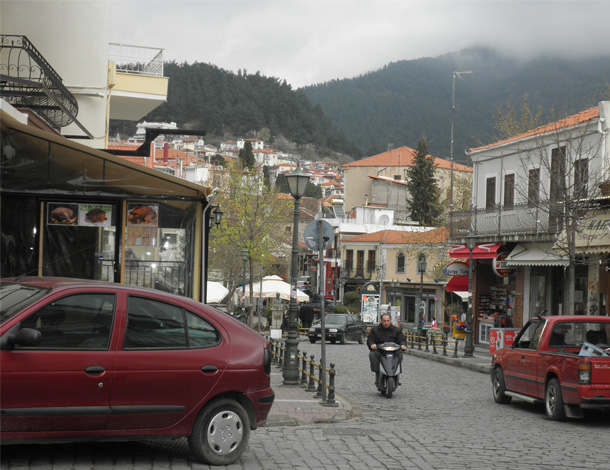Xanthi Redux

Alexander Billinis
Thrace always draws me, its beauty, mystery, and somehow its remoteness and foreignness from the “Heart of Greece” captivates me. Last year, visiting relatives in Kavala, with a zippy car and no obligations my destination was obvious—Xanthi.
I had been there ten years before, with the woman who became my wife, and I wanted to look at the difference a decade makes. Crossing the Nestos River on the now-complete Egnatia Motorway, then as before, minarets suddenly appear in the villages. This is an “unexchanged” Greece where the Muslim population (Turkish speaking and Pomak) remains in situ.
The Egnatia Odos, part of Greece’s excellent Brussels-financed highway network, was practically empty in a Greece gripped by austerity and some of Europe’s highest fuel prices, though there were plenty of Turkish trucks in both directions, signs of their booming economy. I had seen this too in Serbia; Turkish trucks plying all the main routes to Western Europe. I wondered if Western Thrace, so far from a neglectful Athens yet so close to Eastern Thrace and Constantinople, might fall into Turkey’s economic embrace.
Pulling off the German-style autobahn at the exit to Xanthi, the road quickly turns into Greek standard; a little uneven, a fair amount of garbage, and sorely in need of re-asphalting. I remember Xanthi as a city full of veiled women, where Greek and Turkish speaking women stood out immediately in terms of dress. Now, while there were still plenty of women in traditional dress, those under thirty were often indistinguishable; Muslim girls dressed equally as fashionably and declaratively as their Greek counterparts. I also sensed that the clear economic divide between wealthier Christians and poorer Muslims I saw in the past had faded, partially a result of the general impoverishment Greece is currently experiencing, but also, perhaps, due to the great expansion of the Turkish economy only one hundred miles to the east.

As ten years ago, I could not detect an explosive environment in Xanthi, but rather a general civic pride and tolerance, perhaps mellowed by the attractiveness of the city, with its winding streets, traditional architecture, and the embrace of beautiful green mountains above the city. For so long off the beaten path of Greek “progress,” Xanthi in general lacks the concrete eyesore architecture of most Greek cities. As before, conversations with locals helped to confirm my perception. In a cafe I fell into a conversation with well-dressed older fellow at the table next to me, “How are relations between the communities?” I asked. He fingered his worry beads thoughtfully, “we are neighbors and friends. We respect each other. I have so many friends, brotherly friends, who are Turkish and it is out of respect for them that I have learned Turkish.” Echoing a similar sentiment I had heard ten years ago, he added, “when there are problems, usually they are not caused by people from here.”
After a stop at the chamber of commerce for a chat with the director about the economy, I tried to retrace the steps of a decade ago. I recalled a small atelier my wife and I had stopped by a decade earlier. Finding it, I told the artist that we had been there a decade before, and that I just had to pick up a reminder for her. He was happy for business. “Those were better times then, you know,” he sighed, with a wistfulness I am now all too used to seeing. I asked him for a lunch suggestion, and a distinguished looking fellow with white hair and a mustache, who had heretofore been eavesdropping under the mask of reading, broke in, “Go to ‘To Dromaki,’ for the best of Xanthi.”
I took my time to get there, walking the cobbled streets lovingly kept in the old style, which as I went skyward, became studded with the minarets of small mosques. The mansions of an era now passed, when tobacco was king, sat either in a state of gentle decay or recent renovation. Unseasonably cold in April, I wound my way down to the tavern.

I introduced myself to the owner, whose Greek was slightly Bulgarian-accented, and he spared no meze for my table. His son took a chair, “my name is Selim.” He was a Pomak, a Slav Muslim whose traditional language is a dialect of Bulgarian. I switched from Greek to my limited Bulgarian, and we all clinked glasses. Soon enough the fellow who suggested the restaurant sauntered in, and another plate and glass rapidly appeared. He was a Xanthi University professor, and a quick text message brought another colleague. A cold afternoon warmed with the fires of conversation and homemade tsipouro, ranging from the ever-present crisis, to interethnic relations in Thrace, to judgments about which Balkan country produces the best tsipouro. The meze covered a geography from Belgrade to Izmir, as I had been to both places and many in between, the food was both familiar and a journey in one table.
My friends would not let me leave, literally, as the drink needed hours to wash out of my system. Conversation, coffee, and cakes followed. Steadied for the drive back to Kavala, I left once again with good memories of a beautiful town whose people reached across their ethnic divides in tolerance, leavened by good food and drink.
Alexander Billinis is a writer and banker currently living in Serbia. His book “The Eagle has Two Faces: Journeys through Byzantine Europe,” is available on amazon.com











0 comments